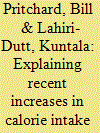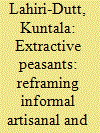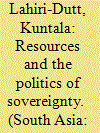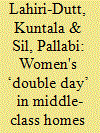| Srl | Item |
| 1 |
ID:
057547


|
|
|
| 2 |
ID:
149920


|
|
|
|
|
| Summary/Abstract |
Coal dominates energy production of modern India, shaping the economic and political milieu of the country and dictating its energy future. But invisible to the state’s view of coal running the nation, are roles played by this commodity in the livelihoods of millions of poor who live on the coal tracts of the country. In this paper, I argue that there are four coal economies — with yet another one lurking within or following behind as a shadow — in India. Each of these economies has different meanings of coal to those who are involved in the economy, producing the'diverse worlds’ of coal. To substantiate my argument, I critically analyse official and field-based primary data within a'diverse economies framework’ to present the intricate interlinkages among these worlds. I show that the multiple coal worlds are neither tiered in a hierarchical manner, nor'parallel’ in the sense of dualism implied in a simplified formal-informal dichotomy. Rather, these worlds of coal have different actors, and their domains are ruled by different norms and values about the qualities of coal as a material commodity; yet they overlap and intersect with each other through their complex labour regimes.
|
|
|
|
|
|
|
|
|
|
|
|
|
|
|
|
| 3 |
ID:
165089


|
|
|
|
|
| Summary/Abstract |
During the past decade, considerable research efforts have sought to explain India’s “calorie consumption paradox”, namely, the coexistence of a decline in average per capita calorie intake in rural India alongside increased material living standards. Evidence from the most recent (68th) round of the National Sample Survey (NSS), released in 2014, however, indicates increases in calorie intake, notably among poorer income quintiles. This paper argues that the turnaround in these data is linked to the improved performance of pro-poor social protection measures. Analysis of data suggests a close association between states that have made the greatest improvements in social policy delivery systems, and increased calorie intake for the poorest quintile of rural populations. This conclusion supports wider international evidence on the importance of social protection strengthening for nutrition-sensitive economic growth.
|
|
|
|
|
|
|
|
|
|
|
|
|
|
|
|
| 4 |
ID:
163056


|
|
|
|
|
| Summary/Abstract |
This paper explores the ongoing reconfiguration of peasant labour processes from agriculture to informal mineral extraction, outlining the motivations of the rural poor in adopting mining and quarrying, and discusses how social sciences can best account for this significant shift towards extractive livelihoods. It argues that the ‘extractive peasants’ best explain the contemporary changes in rural, mineral-rich tracts throughout the Global South, and peasant mining practices are part of the informal economies. The extractive peasants return intellectual attention to practices that disrupt contemporary global mineral production and place the politics of the poor within broader debates on resource politics.
|
|
|
|
|
|
|
|
|
|
|
|
|
|
|
|
| 5 |
ID:
157090


|
|
|
|
|
| Summary/Abstract |
This paper analyses the socio-legal and political spaces within which coal is mined in India and asks if it is possible to raise the ‘moral question’ when the state attributes an iconic status to coal. The empirical evidence comes from two indigenous-dominated states that practise community coal mining. If the coal mining communities in Jharkhand exert a moral claim by mining illegally, those in Meghalaya exert a political claim by invoking the special status the state enjoys under the Indian Constitution. This paper examines this grey zone of non-legality in order to understand resource conflicts and dispossession beyond the straightforward distinctions between legal and illegal.
|
|
|
|
|
|
|
|
|
|
|
|
|
|
|
|
| 6 |
ID:
136300


|
|
|
|
|
| Summary/Abstract |
As middle-class Indian women become economically more active, it is worth exploring who is doing the housework. Are gender roles shifting within the household across the board in urban India? This paper shifts research attention away from the metropolitan cities to a small mofussil town, a relatively conservative urban centre where gender roles have so far been more resistant to transformation than in metropolitan cities that are undergoing radical changes about which much has been written. The methodological tool used in the study is a time-use survey, aimed primarily at extracting quantitative data, to make visible the unseen, unpaid and underpaid work and activities undertaken by women. Individual interviews were used to measure the actual workload of the women as a proxy indicator of gender disparities at the intra-household scale. The paper concludes that conventional sex segregation in household tasks has not changed significantly, and that women's various engagements in the public sphere have doubled the burden of responsibilities. The conceptual and methodological implications of the investigation lie in a reinterpretation of what constitutes ‘work’ for middle-class women, offering renewed understanding of the ways in which women (re)negotiate gendered responsibilities at home and outside of it in rapidly changing times.
|
|
|
|
|
|
|
|
|
|
|
|
|
|
|
|